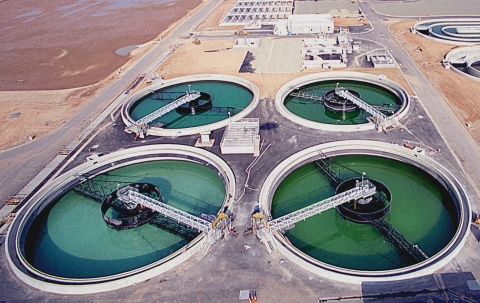Highlights of the Next Five Year Plan
for the Wastewater Research Program at KISR, Kuwait
Dr. Abdallah Abusam
Introduction
* Kuwait is situated in a harsh environment characterized by very little rain fall (100 mm/yr) and very limited freshwater (groundwater) resources. 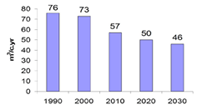
* Reclamation and reuse of wastewater will help augmenting the overall water availability in Kuwait.
* Huge amounts of wastewater are available all through the year.
* Treated wastewater can be reused in domestic, industrial and agricultural sectors, resulting in reduced demand for high quality water.
* Economic and environmental benefits.
* About 800,000 m3/d municipal wastewater is treated at 4 main central activated sludge plants located at Jahra, Riqqa, Sulaibiya and Um-Al-Haiman areas. 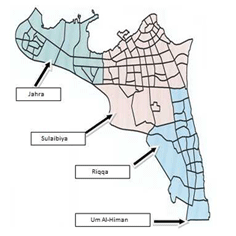
|
Plant |
Design Capacity (m³/d) |
Secondary Systems |
Tertiary/Advance system |
|
Jahra |
86.000 |
6 conventional activated sludge systems
|
Sand filtration + chlorination
|
|
Riqqa |
180.000 |
12 conventional activated sludge systems
|
Sand filtration + chlorination
|
|
Sulaibiya |
375.000 |
9 oxidation-ditch type activated sludge systems
|
Disc filtration +UF + RO + chlorination
|
|
Um Al-Haiman |
27.000 |
4 oxidation-ditch type activated sludge systems
|
Sand filtration + UV + chlorination
|
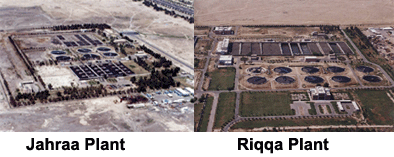
Sulaibiya Plant
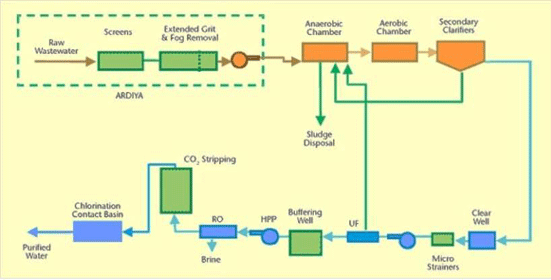
* About 65% of treated wastewater is reused as agricultural and landscape irrigation water.
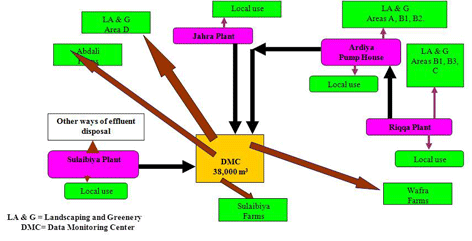
* Advantages of Activated Sludge systems:
- Fast and Efficient removals, e.g. BOD.
- Minimum land requirements.
- Few environmental nuisance.
- Controllable effluent quality.
* Disadvantages of Activated Sludge systems:
- Susceptible to shock loading.
- Needs skilled operators.
- Expensive capital and maintenance costs.
* Sustainability Criteria for Water Treatment Technologies (van Lier et al., 1998):
- No dilution of high strength wastes with clean water.
- Maximum recovery and reuse of treated waste water and by-products.
- Application of efficient, robust and reliable technologies which are low-cost, have long life-time and plain in operation and maintenance.
- Applicable to small as well as big scales.
- Leading to self-sufficiency.
- Acceptable for local population.
Overview of the Five-Year plan
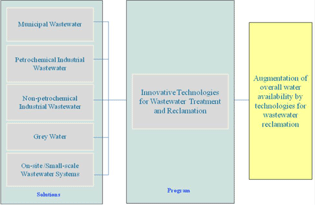
Overview of the Five-Year plan(Cont.)
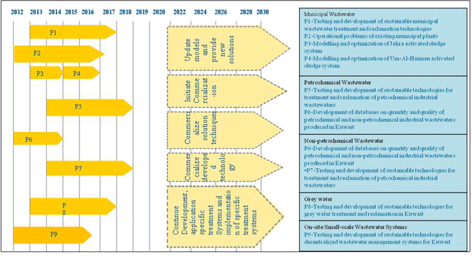
Municipal Wastewater Research Projects
|
Project 1 |
Testing and development of sustainable municipal wastewater treatment and reclamation technologies
|
|
Timing |
5 years, starting from 2013
|
|
Main Objectives |
- Select a number of most promising sustainable technologies to be studied: * wide range of technologies and many reuse options - Develop and test modifications to suit Kuwait conditions. - Produce theoretical then physical model for customization steps of each tested technology. - Use pilot testing to optimize the design and performance of each studied technology.
|
Municipal Wastewater Research Projects (Cont.)
|
Project 2 |
Appropriate solutions to common operational problems of municipal wastewater treatment plants in Kuwait
|
|
Timing |
5 years, starting from 2012
|
|
Main Objectives |
- Find appropriate solutions to common operational problems of municipal wastewater treatment plants in Kuwait such as: * sludge bulking and foaming problems, * production of poor quality sludge, * uncontrolled inflows to WWTPs, * etc.
|
Municipal Wastewater Research Projects (Cont.)
|
Project 3 |
Modelling and optimization of Jahra activated sludge system
|
|
Timing |
5 years, starting from 2013
|
|
Main Objectives |
- Developed and validate a mathematical model for Jahra activated sludge system. - Develop control strategies that optimize the operation of Jahra plant.
|
Municipal Wastewater Research Projects (Cont.)
|
Project 4 |
Modelling and optimization of Um-Al-Haiman activated sludge system
|
|
Timing |
5 years, starting from 2015
|
|
Main Objectives |
- Developed and validate a mathematical model for Um-Al- Haiman activated sludge system. - Develop control strategies that optimize the operation of Um-Al-Haiman plant.
|
Petrochemical Wastewater Research Projects
|
Project 5 |
Testing and development of sustainable technologies for treatment and reclamation of petrochemical industrial wastewaters
|
|
Timing |
5 years, starting from 2014
|
|
Main Objectives |
- Select a number of most promising sustainable technologies to be studied. * wide range of technologies and many reuse options - Develop and test modifications to suit Kuwait conditions. - Produce theoretical then physical model for customization steps of each tested technology. - Use pilot testing to optimize the design and performance of each studied technology.
|
Petrochemicals Wastewater Research Projects (cont.)
|
Project 6 |
Development of databases on quantity and quality of petrochemical and non-petrochemical industrial wastewaters produced in Kuwait
|
|
Timing |
3years, starting from 2012
|
|
Main Objectives |
- Development of databases on quantity and quality of Petrochemical Industrial Wastewater produced in Kuwait - Development of databases on quantity and quality of non-petrochemical industrial Wastewater produced in Kuwait
|
Non-petrochemical Wastewater Treatment and Reclamation Research Projects
|
Project 7 |
Testing and development of sustainable technologies for treatment and reclamation of Non-petrochemical industrial wastewaters
|
|
Timing |
5 years starting 2014
|
|
Main Objectives |
- Select a number of most promising sustainable technologies to be studied. * wide range of technologies and many reuse options - Develop and test modifications to suit Kuwait conditions. - Produce theoretical then physical model for customization steps of each tested technology. - Use pilot testing to optimize the design and performance of each studied technology.
|
Greywater Treatment and Reclamation Research Projects
|
Project 8 |
Testing and development of sustainable technologies for grey water treatment and reclamation in Kuwait
|
|
Timing |
5 years starting 2012
|
|
Main Objectives |
- Select a number of most promising sustainable technologies to be studied. * wide range of technologies and many reuse options - Develop and test modifications to suit Kuwait conditions. - Produce theoretical then physical model for customization steps of each tested technology. - Use pilot testing to optimize the design and performance of each studied technology
|
On-site/Small-scale Treatment and Reclamation Research Projects
|
Project 9 |
Testing and development of sustainable technologies for decentralized wastewater management systems for Kuwait.
|
|
Timing |
5 years starting 2012
|
|
Main Objectives |
- Select a number of most promising sustainable technologies to be studied. * wide range of technologies and many reuse options - Develop and test modifications to suit Kuwait conditions. - Produce theoretical then physical model for customization steps of each tested technology. - Use pilot testing to optimize the design and performance of each studied technology. - Produce appropriate specifications for the use of the technology in Kuwait for treating and reclamation of municipal wastewater.
|
Reference: Work Shop on Appropriate Wastewater Reclamation and Reuse Technologies for Aride Environments - 23 November 2011



